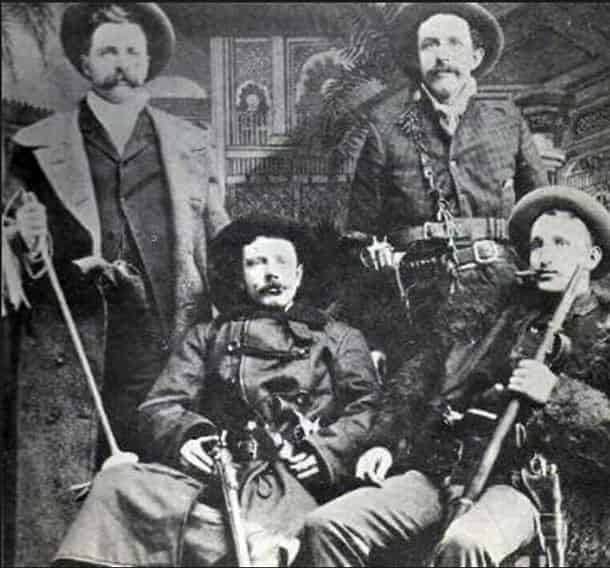The Legend of the Reno Brothers: America’s First Train Robbers

The Reno Brothers, a name that evokes the wild, lawless days of the American frontier, are often regarded as the architects of the first organized train robbery in U.S. history.
Their legacy, filled with daring heists and bloody outcomes, has been immortalized in the annals of criminal folklore. But who were the Reno Brothers, and how did they become notorious in the American Midwest? Let’s dive into the legend of these infamous outlaws.
Early Life of the Reno Brothers
The Reno family hailed from Seymour, Indiana, where five brothers — Frank, John, Simeon (Sim), William, and Clint Reno — grew up. The brothers were raised in a farming family, but by the time the American Civil War erupted, they had already started dabbling in illegal activities. Some historians suggest that the wartime chaos allowed them to hone their criminal skills, taking advantage of the lawlessness and disarray that had spread across the nation.
The brothers became involved in petty thefts and later moved on to more serious crimes like arson and murder. They were emboldened by the lack of effective law enforcement in the region, where isolated communities often lacked the means to stop well-organized criminal groups. By 1866, the Reno Brothers were ready to commit a crime that would etch their names into history books.
The First Train Robbery in U.S. History
On October 6, 1866, the Reno Brothers executed what is considered the first peacetime train robbery in the United States. Near Seymour, Indiana, the gang boarded an eastbound Ohio and Mississippi train. After breaking into the express safe, they made off with around $13,000 (equivalent to over $250,000 today). Though the amount may seem modest by modern standards, it was a significant haul for the time.
This robbery was different from previous thefts, not because it involved a train — as trains had been robbed before, but usually during the Civil War — but because it was the first well-coordinated, peacetime attack on a moving train. The Reno Brothers’ method would inspire future outlaws like Jesse James to attempt similar crimes.
A Crime Spree Begins
Flush with success from their first heist, the Reno Brothers quickly expanded their criminal enterprise. Over the next two years, they were linked to several train robberies, stagecoach holdups, and bank heists across the Midwest. The gang’s tactics were brutal and efficient, with locals living in fear of their raids.
Their notoriety grew, and soon the Pinkerton National Detective Agency — one of the first formal law enforcement organizations in the U.S. — was hired to track them down. This marked the beginning of a tense cat-and-mouse game between the Reno Gang and the law.
The Downfall of the Reno Brothers
In 1868, the Reno Brothers’ luck began to run out. A series of botched heists and increased pressure from law enforcement brought the gang under heavy scrutiny. Several members of the Reno Gang were captured and jailed, and public outrage over their actions had reached a fever pitch.
Frank and Simeon Reno, along with several accomplices, were captured after a failed robbery in southern Indiana. However, their downfall wasn’t brought about by a fair trial. Instead, vigilante justice — in the form of lynch mobs — dealt the final blow to the Reno Brothers.
The Seymour Lynchings
On December 12, 1868, Frank, Simeon, and fellow gang member Charlie Anderson were lynched by an angry mob while in custody at the New Albany jail. The mob, consisting of outraged locals and masked men, stormed the jail, overwhelmed the guards, and:in 1861, their lives took a dark turn. Frank and John Reno, in particular, were known for their involvement in various criminal activities long before their famous heists. The chaos of the Civil War provided fertile ground for opportunistic crime, and the Reno Brothers seized that moment to sharpen their lawbreaking skills.
Rise to Infamy
The Reno Brothers gained their first taste of organized crime during the Civil War when they began stealing from Union Army supply depots and trains. The war left much of the country destabilized, and law enforcement in rural areas was weak, giving the Renos a chance to operate with relative impunity. After the war, they turned their focus toward robbing trains and banks, seeing these as high-reward targets.
The First Train Robbery in U.S. History
On October 6, 1866, the Reno Brothers cemented their place in American history. In what is considered the first train robbery in the United States, they stopped an Ohio and Mississippi Railway train near Seymour, Indiana. Disguised and armed, they boarded the train and broke into an Adams Express safe, making off with approximately $16,000 in cash (equivalent to about $300,000 today).
The daring heist sent shockwaves across the country. Train robberies were unheard of at the time, and the success of the Reno Brothers’ heist inspired other outlaw gangs to follow suit in the years that followed. It marked the beginning of a new era of crime in America — an era where the vast rail network that was helping to expand the country’s frontier became a prime target for bandits.
The Downfall of the Reno Brothers
The success of the Reno gang was short-lived. They continued to commit a series of bank and train robberies throughout Indiana, Missouri, and even as far as Canada. However, their increasing notoriety brought them into the crosshairs of the Pinkerton National Detective Agency, a private security firm that had gained a reputation for tracking down notorious criminals.
After a series of arrests, escapes, and more heists, the Reno Brothers began losing their grip. The law, along with angry citizens, started to close in. By 1868, several members of the gang, including Frank, John, and Sim Reno, were captured. However, what followed was a brutal form of frontier justice.
Vigilante Justice and the End of the Reno Gang
Public outrage over the Reno Brothers’ reign of terror reached a boiling point. Local citizens, fed up with the gang’s lawlessness and the slow pace of the legal system, took matters into their own hands. In December 1868, after the Reno Brothers were captured and awaiting trial, a mob of vigilantes stormed the jail in New Albany, Indiana.
In a swift act of mob justice, Frank, William, and Sim Reno were dragged from their cells and lynched. This marked a brutal end for the Reno Gang, a group that had only a few years prior been one of the most feared criminal organizations in the Midwest.
Legacy of the Reno Brothers
While the Reno Brothers’ criminal careers were short-lived, their legacy lives on in American folklore. Their train robberies set a precedent, influencing later outlaws such as Jesse James and Butch Cassidy, who also turned to the railroads as a source of wealth. The Reno Brothers’ story has been retold in books, films, and television shows, cementing their status as one of the earliest symbols of organized crime in America.
In fact, the Reno Brothers’ saga even inspired one of Hollywood’s greatest icons, Elvis Presley. His first movie, Love Me Tender (1956), was loosely based on the story of the Reno Brothers, adding a touch of romanticism to their infamous tale.
The Town of Seymour: A Lasting Reminder
The town of Seymour, Indiana, remains closely tied to the Reno Brothers’ legacy. To this day, the town embraces its unique place in American criminal history. In some ways, the Reno Brothers have become local legends, their exploits serving as a reminder of the rough-and-tumble days of the Old West.
While the Reno Brothers may have been outlaws, their influence on American history is undeniable. They blazed a trail for others to follow, marking the beginning of an era where the railroads became synonymous with both opportunity and danger.
The legend of the Reno Brothers stands as a testament to the early days of crime in post-Civil War America. From humble beginnings in rural Indiana to their notorious status as America’s first train robbers, the Reno Brothers captivated the public imagination. Their tale is one of greed, violence, and ultimate tragedy, but it’s also a story of the rapidly changing American landscape in the 19th century.
For better or worse, the Reno Brothers have earned their place in history, and their daring exploits will continue to intrigue those fascinated by the wild days of the American frontier.
